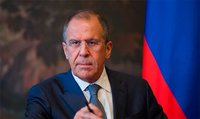Obama's UN speech moves Kremlin walls
During the talks between Russian Foreign Minister Sergei Lavrov and US Secretary of State John Kerry, for the first time on an official level, the head of the Russian diplomatic service used the term "Novorossiya" in relation to the People's Republics of Donetsk and Luhansk.

According to diplomatic sources, the two officials discussed the process to establish dialogue between the authorities in Kiev and the leadership of Novorossiya.
Lavrov and Kerry also discussed the situation in Ukraine in the context of efforts to achieve sustainable truce in the southeast and build direct dialogue between the authorities in Kiev and the leadership of Novorossiya in the context of the implementation of Minsk agreements.
Sources emphasize that term "Novorossiya" was used deliberately and without quotation marks. Noteworthy, prior to the meeting with Kerry, Lavrov called the conflict in Ukraine solely a Ukrainian conflict.
Assistant to President Putin, Yuri Ushakov, on Friday commented on the information about a possible meeting between the Russian leader with his Ukrainian counterpart Petro Poroshenko. Ushakov also expressed his point of view on US President Obama's speech at the UN.
According to Ushakov, Putin's meeting with Poroshenko in Europe is likely to happen. "This subject is being discussed," said Yuri Ushakov, adding that Vladimir Putin and Petro Poroshenko discuss such a possibility in personal telephone conversations," ITAR-TASS reports. However, possible dates of the meeting remain unknown, said the presidential aide.
Poroshenko said at a large press conference in Kiev on September 25 that the next meeting with the President of the Russian Federation would take place "in a few weeks in a multilateral format in Europe." According to Poroshenko, the meeting will discuss the implementation of the peace plan in eastern Ukraine. Earlier, it was reported that Putin would attend the forum Asia-Europe (ASEM) in Milan, Italy, on October 16-17.
Ushakov also confirmed that Putin sent a letter to the administrations of the EU and Ukraine describing Russia's position on the consequences of the ratification of the Association Agreement between Ukraine and the European Union. Two weeks ago, after the tripartite talks between representatives of Russia, Ukraine and the EU in Brussels, it was decided that the agreement would be delayed for 15 months - from November 1, 2014, to the beginning of 2016.
Commenting on the possibility of adopting the law in Kiev to waive the non-aligned status of Ukraine, the presidential aide told reporters that Russia still supported the status of the neighboring country, Interfax reports.
Earlier, Ukrainian President Petro Poroshenko instructed the Cabinet to elaborate a draft law about the refusal from the country's non-aligned status. The Verkhovna Rada will consider this document at the next plenary meeting, on October 14.
Putin's aide also gave his assessment to the recent speech from American President Barack Obama at the UN General Assembly. During the speech, Obama ascribed Russia to global threats, such as Ebola and Islamic State militants. The Kremlin considered Obama's statement strange and unprecedented, said Ushakov.
"When the president of the United States names so-called Russian aggression in Europe among other challenges to international security, somewhere between Ebola virus and terrorist actions, I would say that I do not recall any incident, when Obama's predecessors would characterize Russia's role and place in international affairs like that," Ushakov said, ITAR-TASS reports.
Speaking at the UN General Assembly, Obama named world's major, in his opinion, threats that exist today. The biggest threat, he said, is Ebola virus, and the second biggest threat is Russia's actions in Europe. The third place was given to terrorists in Syria and Iraq.
The speech from the US President raised eyebrows of the head of the Russian Foreign Ministry Sergei Lavrov, who also attended the meeting. "This is the American view of the world that the president expressed, emphasizing the exceptionalism of his country and nation. This is the view of the country, which put down its right in the national security doctrine to use force at its discretion regardless of any UN Security Council resolutions or any other legal acts," said the head of the Russian diplomacy.
"It also appeared strange to me that the US President said several times that the world has become freer and safer. I did not even understand whether it was said seriously," Russian Foreign Minister Lavrov said during his speech in New York.
Pravda.Ru
Subscribe to Pravda.Ru Telegram channel, Facebook, RSS!

